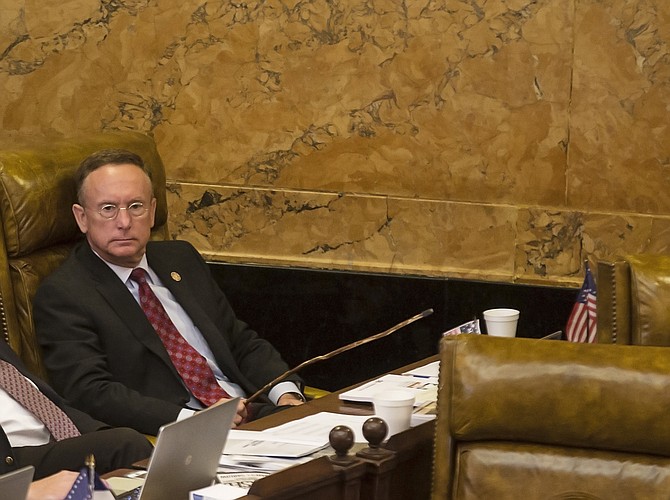Rep. Karl Oliver sat poker-faced as black lawmakers talked about more than 600 lynchings that took place in Mississippi from 1877 to 1950. Photo by Imani Khayyam.
JACKSON, Miss. (AP) — In 2015, a white Mississippi lawmaker went to the front of the state House chamber and apologized for saying in an interview that black people in his town were getting food stamps and what he called "welfare crazy checks."
The apology by a deflated-looking Republican Rep. Gene Alday of Walls lasted only about 30 seconds. It was received by tepid applause, but critics gave him credit for taking responsibility for his own words.
Fast forward to 2017: Another white lawmaker, Republican Rep. Karl Oliver of Winona, said May 20 on Facebook that people should be "LYNCHED" — in all caps — for taking down Confederate monuments. The post was prompted by the removal of statues in New Orleans. Oliver's words attracted swift and widespread criticism, as well as some support, from inside and outside Mississippi. Republican House Speaker Philip Gunn condemned Oliver's post and stripped the freshman lawmaker of a committee vice chairmanship.
Oliver wrote an apology on Facebook after his original post had remained online more than a day and a half. Legislators met in special session last week for the first time since his inflammatory post, and Oliver chose not to give a speech to explain himself to his colleagues or the general public.
Oliver also declined to speak to reporters the day of the special session, telling The Associated Press that he had already said what he wanted in his online apology and that he had made one-on-one apologies to some black colleagues.
Operating rules of the Mississippi House and Senate allow any member to make a "personal privilege" speech about any matter that affects the "safety, dignity and the integrity" of the Legislature or the "rights, reputation and conduct" of individual lawmakers.
Although Oliver didn't speak, 11 black representatives did.
The personal privilege speeches came late in the evening of a one-day session to finish the state budget. It had been a hurry-up-and-wait sort of day, with long delays between debates. Members were tired and ready to go home.
Oliver sat poker-faced as black lawmakers talked about more than 600 lynchings that took place in Mississippi from 1877 to 1950. Democratic Rep. Kathy Sykes of Jackson said one of her relatives had been lynched in Mississippi in the 1940s.
Several seats in the House chamber were empty during the speeches. Black and white lawmakers who remained sat silently, and most appeared to listen. Democratic Rep. Adrienne Wooten of Jackson said she saw "smirks" on some faces while she spoke.
"I'm of the mindset that the gentleman was fully aware of what he was typing," Wooten said of Oliver. "He may not have thought that somebody who looks like me would read it. I'm sure it was for a particular audience, but it stretched across the line and you can't take it back."
Democratic Rep. Robert Johnson of Natchez said Oliver had reinforced stubborn stereotypes about Mississippi being stupid and backward.
Rep. Chris Bell, a Democrat from Jackson, said he and Oliver were both first elected in 2015, and Oliver has never spoken to him. Bell rejected Oliver's online apology: "It's garbage to me. It was garbage to a lot of people around this world and this nation."
Alday lost his bid for re-election months after he offended a broad swath of the population. More than two years remain in the current term, and Oliver shows no inclination to resign. But his words online and his decision not to give a speech apologizing to the House will limit his effectiveness in a chamber where relationships matter.
Copyright Associated Press. All rights reserved. This material may not be published, broadcast, rewritten, or redistributed.


